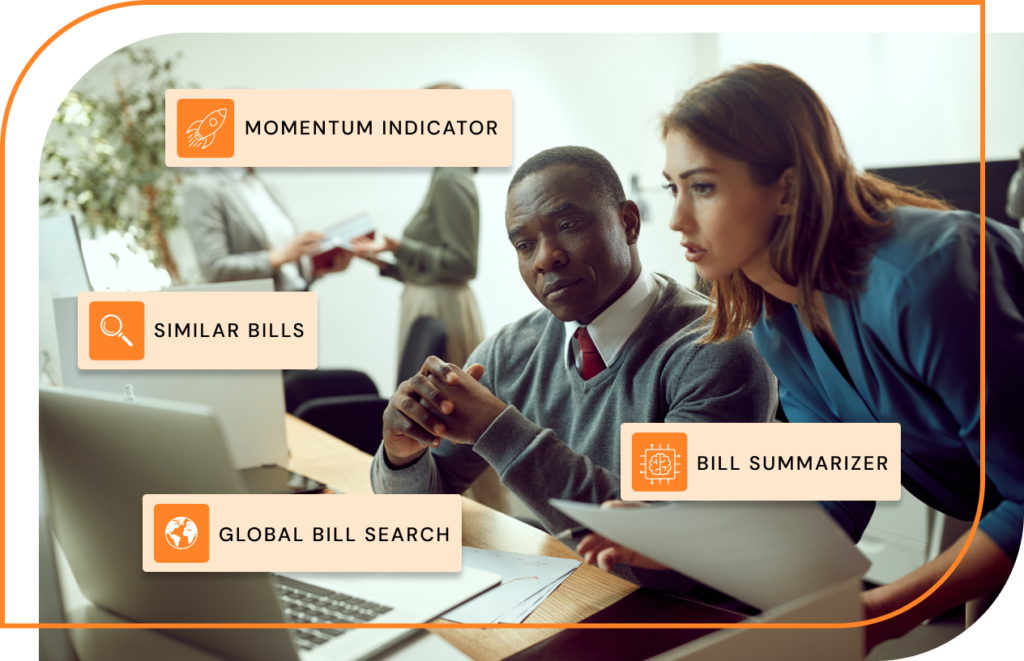Today’s economy is dominated by knowledge-driven roles. Sectors like technology, law, healthcare, and, notably, lobbying and government relations exist within the knowledge industry. These knowledge industry sectors depend heavily on adept information management. This is a domain where artificial intelligence (AI) excels. Many commonly-held fears dominate the narrative around AI. Contrary to common fears, AI does not act as a job usurper in this context. Rather, than replacing human workers, AI is a collaborator. Using AI enhances productivity and decision-making. In this blog, we explore how AI tools support and amplify the capabilities of knowledge workers. In particular, we explore the use of AI in the complex arena of lobbying and government relations.
The Knowledge Industry and AI
AI is profoundly reshaping various sectors. It automates routine tasks, optimizing complex decision-making processes, and enhancing overall productivity. Within the context of the knowledge industry, AI is particularly transformative. AI tools help professionals manage vast amounts of data with unprecedented efficiency. For example, AI systems analyze large data sets to extract trends and actionable insights. In doing so, AI assists in quicker, more informed decision-making. This capability is invaluable in environments where strategic decisions need to be made rapidly. This includes the financial services industry or in public policy work.
AI tools support knowledge workers in many ways. With effective use of AI, workers are able to focus on more intellectually demanding and creative tasks. This shift doesn’t just improve operational efficiencies. It also enhances job satisfaction by reducing the monotony of routine tasks, such as data processing. When their organizations effectively use AI tools, workers can engage more in critical thinking and problem-solving activities. By doing so, they add greater value to their organizations.
Furthermore, AI has the ability to learn from data and adapt over time. This leads to continuous improvements in workflows and processes. For example, machine learning models can predict outcomes based on historical data. With this information, organizations can to better anticipate market trends or customer needs. Additionally, AI-driven tools like chatbots and virtual assistants can manage customer queries, provide personalized recommendations, and improve user experiences without human intervention.
As they evolve, AI technologies will become even more integral to the knowledge industry. AI is going beyond streamlining existing processes. It’s also creating new possibilities for innovation and efficiency. Continuously integrating AI ensures that it remains an invaluable partner in the growth and evolution of knowledge-based industries. It’s clear that AI enhances both the reach and effectiveness of professionals within these sectors.
Fears Surrounding the Knowledge Industry and AI
Despite clear benefits, fears persist about AI’s impact. In particular, concerns surrounding employment and ethical considerations in the knowledge industry prevail. Concerns often center around the potential for AI to automate tasks to such an extent that it displaces human workers. This is especially the case in roles that involve data processing and routine administrative tasks. There is also apprehension about the decision-making power being ceded to algorithms. Fears center around the fact that algorithms might not fully understand or respect the nuanced ethical and social implications of their outputs.
These fears are not unfounded, but they do not capture the complete picture. AI is primarily used to augment human capabilities, not replace them. This is of particular importance in lobbying and government relations. AI tools analyze data and identify trends. However, human experts are still needed to interpret these findings within the context of existing political and social landscapes.
Moreover, the integration of AI into the workplace includes checks and balances. Ethical AI usage involves:
- Transparent methodologies
- Accountability for decisions made with AI’s help
- Continuous monitoring to ensure fair and unbiased outcomes.
Policies and guidelines are being developed to govern AI use, ensuring that it supports workers rather than undermines them.
Beyond these efforts, additional essential steps are needed to mitigate these fears. These include:
- Educating the workforce about AI’s role and potential
- Addressing misconceptions through training
- Fostering a culture of collaboration between human intelligence and AI
All of these steps center around focusing on AI as a tool for enhancement rather than replacement. With this mindset shift, the knowledge industry can navigate the challenges and harness AI’s potential responsibly and effectively.
Use Cases: The Knowledge Industry and AI
AI has many use cases in knowledge management sectors and roles. Below, we detail some potential use cases.
Data Analysis
AI is pivotal in transforming data analysis. Natural Language Processing (NLP) tools are capable of processing vast amounts of information and analyzing extensive text data both quickly and efficiently. This could include legislative documents, public feedback, and policy briefs. In the world of public policy and government relations, staying ahead is the key to success. AI tools help lobbyists and government relations teams stay informed about legislative changes and public sentiments.
Content Creation
AI is revolutionizing the field of content creation within the knowledge industry. Generative AI tools enable the automatic generation of reports, presentations, and informative materials. For example, generative AI can produce detailed analyses of proposed legislation. AI makes it easier than ever to highlight potential policy impacts and key points of interest for stakeholders.
Organizational Knowledge Management
AI is enhancing organizational knowledge management by streamlining data integration and retrieval processes. AI systems can organize, tag, and classify vast amounts of data, making it accessible to team members across an organization. A centralized approach to knowledge management reduces time spent searching for information. It also minimizes the risk of data silos, ensuring a more cohesive and informed decision-making process.
AI’s Impact on Lobbying and Government Relations
AI tools are making significant strides in enhancing the effectiveness and efficiency of policy teams. By providing insights into public policy, AI helps teams understand legislative developments and craft informed strategies. AI helps lobbyists and policy teams:
- Monitor legislative activities
- Analyze public opinions
- Track regulatory changes
The ability to quickly process and react to new information grants a competitive edge. AI helps ensure that lobbying efforts are not just reactive, but also strategic and forward-thinking. With AI, policy teams are able to more effectively influence policy.

Plural’s AI Tools
Plural’s AI tools are indispensable for successful public policy teams. With Plural, policy teams can anticipate legislative changes, understand their potential impact, and develop proactive strategies. Plural’s AI-driven software analyzes vast amounts of legislative data to identify trends, predict outcomes, and offer actionable insights. Learn more about Plural’s AI tools below.
Similar Bills
With Plural, it’s easy to discover related and highly similar bills. This includes Omnibus bills, or bills with a high degree of text similarity, like model bills.
Global Bill Search
Plural’s Global Bill Search Tool helps users see whether similar bills have been introduced across multiple jurisdictions.
Momentum Indicator
During the legislative session, use Plural’s Momentum Indicator to see which bills are likely to come up for a vote by the end of session.
Bill Summaries and Topics
Plural’s revolutionary AI-powered bill summarization tool condenses long, dense bill text into a short summary that retains the key details of the bill. Discover version-to-version bill summaries to see changes quickly and succinctly. Plus, unlock AI-generated bill topics to streamline your search and organization.
Plural for Policy Teams
Plural provides deep insights into legislation, empowering policy teams to elevate their effectiveness. As AI continues to evolve, its role as a collaborative partner in the knowledge industry is undeniable.
Interested in getting started with Plural? Book a demo today!
More Resources for Public Policy Teams
Key Benefits of AI for Lobbying & Advocacy
Want to be able to explain the benefits of artificial intelligence for lobbying and advocacy? Everyone is talking about AI. And we get it, it’s not simple to understand. But as an AI-powered organization, Plural is here to help you get the most out of advancements in AI to make your job as a policy […]
2025 Legislative Committee Deadlines Calendar
Staying on top of key deadlines is manageable in one state, but if you’re tracking bills across multiple states, or nationwide, it quickly becomes overwhelming. That’s why we created the 2025 Legislative Committee Deadlines Calendar. Stay ahead of important dates and download our calendar today. Get started with Plural. Plural helps top public policy teams get […]
End of Session Report: Florida 2024 Legislative Session
The 2024 Florida legislative session saw significant activity in the realm of insurance and financial services, reflecting key themes of consumer protection, market stability, and regulatory modernization.





